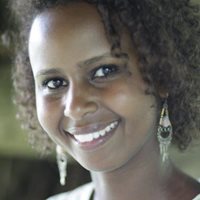Nadifa Mohamed is the author of Black Mamba Boy and the 2010 winner of our Betty Trask Prize. We spoke to her about the public and private aspects of writing.
The 2016 Betty Trask shortlist will be announced on 1 June and the winner of the Betty Trask Prize presented at Society of Authors Authors' Awards on 21 June.
 Nadifa Mohamed
Nadifa Mohamed
Nadifa Mohamed was born in Hargeisa in 1981 while Somalia was falling deeper into dictatorship. In 1986 she moved to London with her family in what she thought was a temporary move but a couple of years later it became permanent as war broke out in Somalia.
She was educated in London and went to Oxford to study History and Politics and she finally returned to Hargeisa, now in the new Republic of Somaliland, in 2008. She lives in London and is currently working on her third novel.
For your first novel Black Mamba Boy you received the Betty Trask Prize and were named as a ‘Best Young British Novelist’ by Granta. What impact did such accolades have on your career?
A level of confidence, I would say. It's difficult to know, when writing, how your work will be perceived, the process of a private work becoming public is very difficult but awards can soften the blow...
You’re working on a third novel, I believe. Has your writing process and approach changed since you started out? Has the reception of previous books had an impact?
The chief difference is that my first novel was a collaboration with my father and although my other novels have involved first-hand research, they have not been as intensely involved in another person's life, someone that you can pore over maps with, go over stories again and again, go on research trips with. The reception of previous books has less of an impact than your own reactions to those works, I think. I tend to want to run away from the psychic landscape I have just inhabited and immerse myself in something completely different. I still listen to music all the time when I write, however, and find it a slow, drip-drip process.
Are there things – subjects, issues, people or places – that you would write about now which you wouldn’t have tackled before? Are there still areas you aren’t willing to go?
I don't think there are any areas that i'm absolutely not willing to go; the pleasure of fiction is that you can go anywhere and travel in time, space and perspective. I have avoided writing anything too similar to my own life because I find that less inspiring and too close to what Toni Morrison calls 'parasitism'.
My heart belongs to novel-writing, it's like taking a long, sail voyage and not quite knowing where you will end up.
You write novels, short stories and journalism– do you prefer, or find more natural, any one of these? How does your writing process differ for each? Do you think the different forms lend themselves to tackling different themes and issues?
Short stories and articles are fun because they are so quick! You don't have to give over years of your life and short stories allow you to experiment in tone and voice in a much less stressful way. However, my heart belongs to novel-writing, it's like taking a long, sail voyage and not quite knowing where you will end up. You don't have to choose between different themes or subjects because you can use, or at least try to use, as many as you like.
Do you think about how your work fits into a wider literary landscape?
Not consciously, I am variously described as an African writer, a Somali writer, a British writer and, in Germany, as a writer of 'New World Literature', it seems more interesting to try and expand those categories rather than to choose one.
The reception of previous books has less of an impact than your own reactions to those works, I think.
What advice would you give to writers starting out?
Keep going. Don't show your work to too many people early on. Take risks but also breaks when you need them.
What is your experience of the publishing landscape for ethnic minorities and mixed-race writers? Is the situation changing?
It is difficult to say, each writer has a different experience but more generally, yes, there is more space for writers from previously marginalised backgrounds to be published and read more widely. My time working in a library before publishing 'Black Mamba Boy' revealed to me the prejudices that mean that black writers are almost treated as being a genre of their own, rather than a heterogenous, international crowd writing works that might have little in common.
What or who are you reading at the moment? And what have you most recently re-read?
I'm reading many books on human zoos and the exhibiting of cultures, something I've been fascinated with for a long time and which feeds into the life of one of the characters in my third novel. Spectacle by Pamela Newkirk about Ota Benga, who was exhibited in the Bronx Zoo, is particularly good.
The 2016 Betty Trask shortlist will be announced on 1 June and the winner of the Betty Trask Prize presented at Society of Authors Authors' Awards on 21 June.